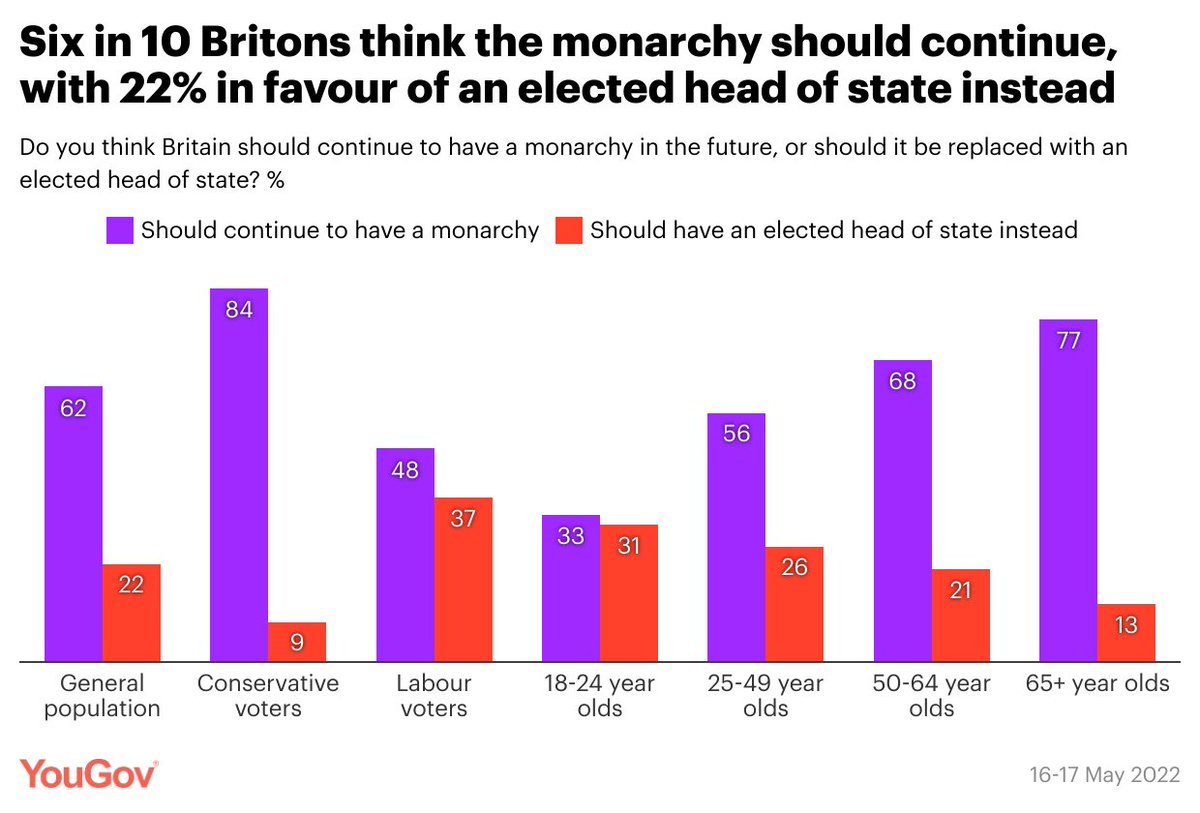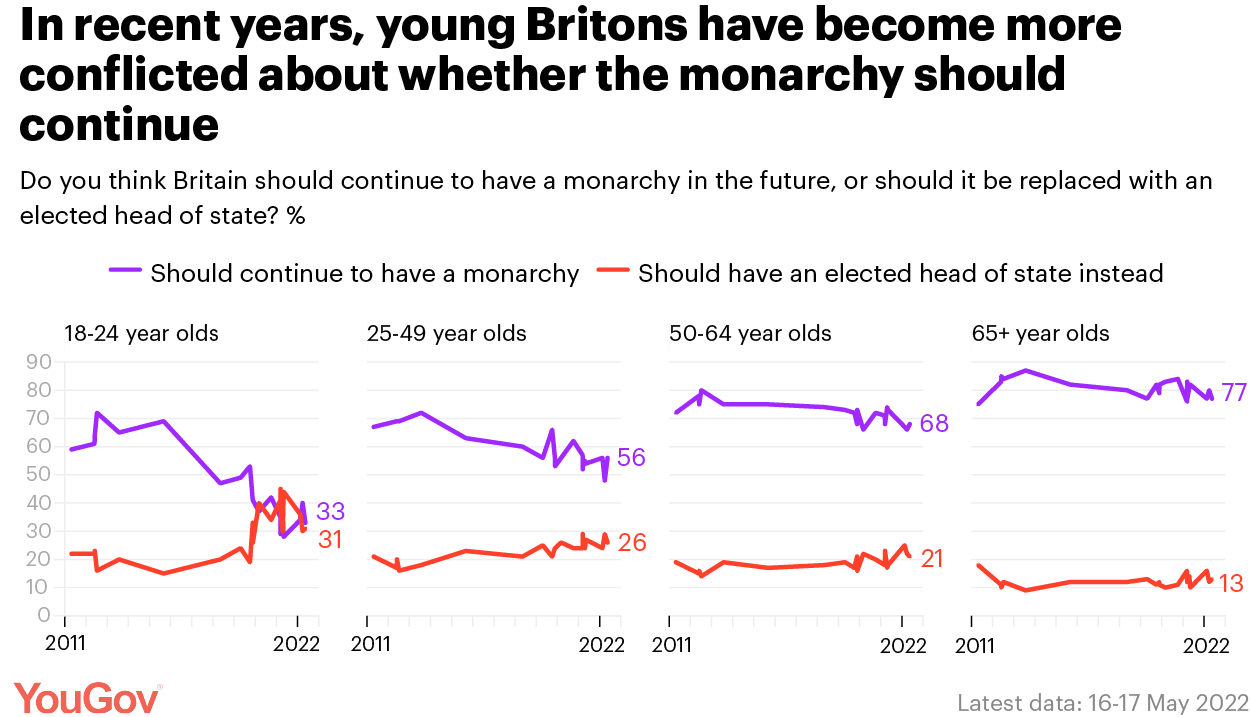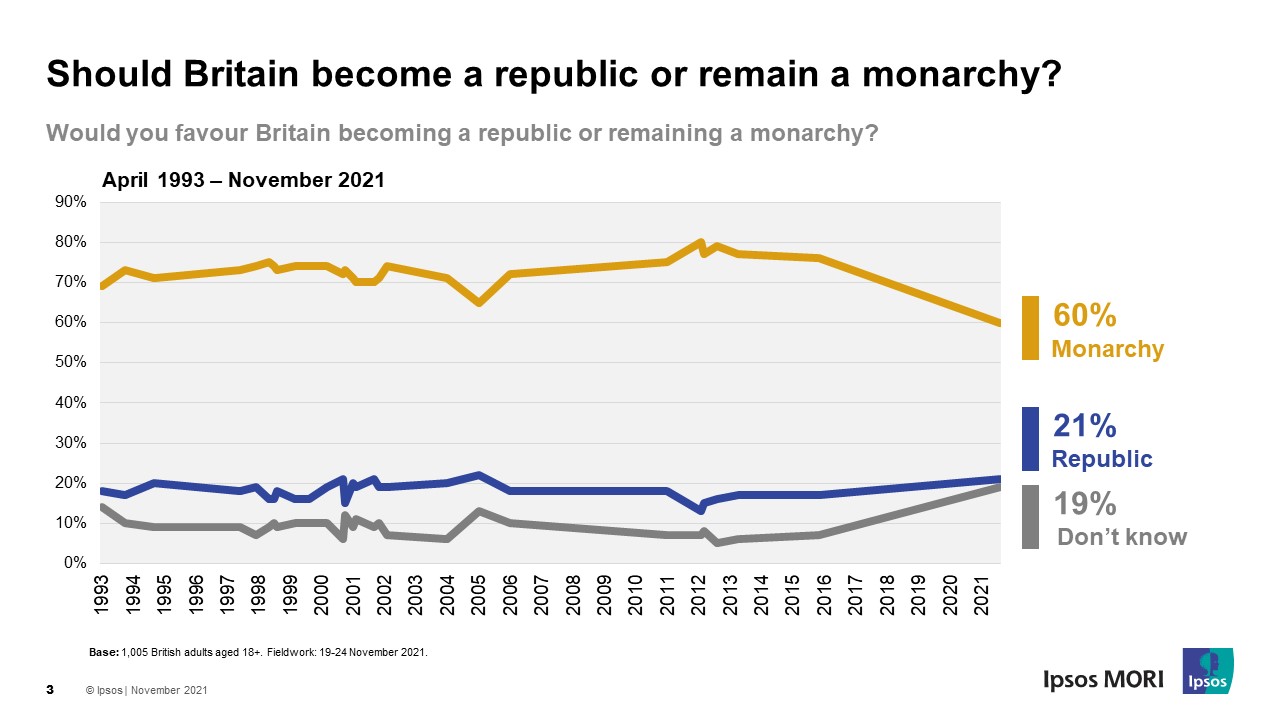Part
01
of two
Part
01
What is the sentiment toward the British monarchy in the UK and beyond?
Key Takeaways
- A recent poll by YouGov shows that 62% (six in ten) of Britons want Britain to remain a monarchy, while 22% believe the country should become a republic.
- Between 2011 and 2022, the support for monarchy declined among younger people (i.e., 18-24 and 25-49). However, it remained relatively stable among older generations.
- The British monarchy offers economic benefits to the UK, hence why most Britons support the continuation of the monarchy.
- "British royal family is popular in France because it embodies the symbolic power capable of bringing together an entire people."
Introduction
In the past years, most Britons have supported Britain remaining a monarchy. While the majority are still pro-monarchy, the number of people supporting the system has been declining significantly. This research provides an overview of public sentiments toward the British monarchy in the UK and other European countries, specifically France and Germany.
Recent Poll Results On Support for the Monarchy
- According to a poll by Ipsos in November 2021, about 60% (three in five) of Britons want Britain to remain a monarchy. Although this statistic represents the majority of Britons, it dropped from 76% (three in four) in February 2016. It is also the "lowest level of support the monarchy has received since the question was first asked in 1993."
- Another poll by YouGov shows that 62% (six in ten) of Britons want Britain to remain a monarchy, while 22% believe the country should become a republic. However, according to the report, the number of Britons supporting the monarchy has declined from 75% in 2012 to 62% in 2022.
- 33% of Britons aged 18 to 24 want the monarchy to continue, while 31% want the country to have a head of state.
- About 84% of Conservative voters support the continuation of the British monarchy, while 9% want an elected head of state.
- 48% of Labour voters want the monarchy to continue, compared to 37% who would prefer an elected head of state.
- The graph below shows the support for monarchy by age and political affiliation.
- The chart below shows that between 2011 and 2022, the support for monarchy declined among younger people (i.e., 18-24 and 25-49). However, it remained relatively stable among older generations.
- The chart below shows how the sentiment toward Britain remaining a monarchy changed from 1993 to 2021, illustrating a drop in support for the monarchy starting in the mid-2010s.
Factors Contributing to the Level of Support of Monarchy
Economic Benefits
- The British monarchy has strong economic benefits, which is likely why most Britons support for the continuation of the monarchy. According to the Hindu Business Line, the monarchy has been generating huge revenue above the nation's expenses. British brands have been receiving a significant boost for their businesses from the monarchy in Britain and globally. This is likely because fourteen countries, including Canada and Australia, are also headed by the British monarch.
- Every year, British Royals have nearly 3,200 public engagements. "These and their numerous foreign visits indirectly push the ‘Buy British’ campaign quite a bit. The estimated benefit to the UK economy delivered by the monarchy through trade and international relations is £150 million annually."
- Tourism is the sector that has benefited greatly from the monarchy. Many tourists are attracted by the Royal Borough of Kensington and Chelsea and other royal events, which have several attractions associated with the monarchy.
Succession Problem and Scandals Surrounding the Royal Family
- Following the death of Queen Elizabeth II, some critics believe that the monarchy should end as King Charles, who has now succeeded the late queen, has not proven to have the moral leadership to rule. His life has had a lot of controversies, like investing millions in offshore tax havens and receiving millions for his foundation from questionable sources like Osama Bin Laden's family.
- King Charles also lobbied the government for several policy shifts, despite the British monarch being a neutral entity.
- A recent survey conducted by YouGov in 2021 found that 49% of UK citizens support the then Prince Charles, compared to 42% who are negative about him. His mother, Queen Elizabeth II, was approved by 80% of UK citizens. These statistics depict that King Charles's level of public trust is very low compared to the approval of his mother.
- "Critics believe that his on-the-record views could cause a constitutional crisis if the government adopts a position he has previously backed — from supporting farmers to approving controversial architecture," according to NBC.
- The reputation of the royal family has also been degraded by the behavior of Andrew, King Charles’ brother and the treatment of Meghan, Prince Harry’s wife and the Duchess of Sussex.
Perceptions of the British Monarchy from other European Countries
France
- The political class in France has been unanimously supporting the British monarchy for many years despite being a republic. Stéphane Bern, a French journalist and TV presenter, says that the "British royal family is popular in France because it embodies the symbolic power capable of bringing together an entire people."
- France is known to have guillotined their royals in 1793, but this has not lowered their affection and interest in the British monarchy. Former president of France, Charles de Gaulle, once said, "the French have a taste for princes, but they will always look abroad."
- French presidents are known to have some semi-monarchical trappings. The current president, Emmanuel Macron, is said to have "royally" begun his reign before being pressured to adopt a sensible governing style that resonates with the public.
Germany
- According to DW, about 50% of Germans support the British royal family. Their love for the British Monarchy comes from the historical reconciliation between Germany and Britain after the Second World War, which created strong ties between the two nations. After the death of Queen Elizabeth II, Olaf Scholz, the German Chancellor, acknowledged her significant contribution to repairing the relationship between Germany and Britain after World War II. Even during her state visit in 2015, she was welcomed by an enthusiastic crowd when she went to lay a wreath commemorating the Holocaust's 70th anniversary.
- According to Christian Handel, an author and fairy tale expert, Germans' love for the royal family comes from their fascination with fairy tales that portray the beauty and power of royalty. Grown-ups are also fascinated with the gossip and scandals surrounding the royal family, especially their private lives.



